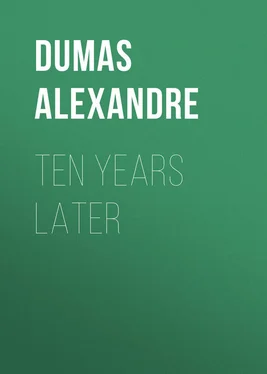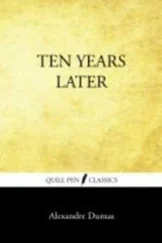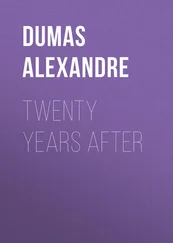Alexandre Dumas - Ten Years Later
Здесь есть возможность читать онлайн «Alexandre Dumas - Ten Years Later» — ознакомительный отрывок электронной книги совершенно бесплатно, а после прочтения отрывка купить полную версию. В некоторых случаях можно слушать аудио, скачать через торрент в формате fb2 и присутствует краткое содержание. Жанр: literature_19, foreign_antique, foreign_prose, на английском языке. Описание произведения, (предисловие) а так же отзывы посетителей доступны на портале библиотеки ЛибКат.
- Название:Ten Years Later
- Автор:
- Жанр:
- Год:неизвестен
- ISBN:нет данных
- Рейтинг книги:4 / 5. Голосов: 1
-
Избранное:Добавить в избранное
- Отзывы:
-
Ваша оценка:
- 80
- 1
- 2
- 3
- 4
- 5
Ten Years Later: краткое содержание, описание и аннотация
Предлагаем к чтению аннотацию, описание, краткое содержание или предисловие (зависит от того, что написал сам автор книги «Ten Years Later»). Если вы не нашли необходимую информацию о книге — напишите в комментариях, мы постараемся отыскать её.
Ten Years Later — читать онлайн ознакомительный отрывок
Ниже представлен текст книги, разбитый по страницам. Система сохранения места последней прочитанной страницы, позволяет с удобством читать онлайн бесплатно книгу «Ten Years Later», без необходимости каждый раз заново искать на чём Вы остановились. Поставьте закладку, и сможете в любой момент перейти на страницу, на которой закончили чтение.
Интервал:
Закладка:
“Well, what is your opinion?”
“My opinion is that the portrait must be flattering, my lord.”
“Of that,” said the prince triumphantly, “there can be no doubt; but let us suppose that it is not, what would your opinion be?”
“My lord, that your highness is exceedingly happy to have so charming a bride.”
The Chevalier de Lorraine burst out laughing. The prince understood how severe towards himself this opinion of the Comte de Guiche was, and he looked somewhat displeased, saying, “My friends are not over indulgent.” De Guiche looked at the portrait again, and, after lengthened contemplation, returned it with apparent unwillingness, saying, “Most decidedly, my lord, I should rather prefer to look ten times at your highness, than to look at Madame once again.” It seemed as if the chevalier had detected some mystery in these words, which were incomprehensible to the prince, for he exclaimed: “Very well, get married yourself.” Monsieur continued painting himself, and when he had finished, looked at the portrait again once more, turned to admire himself in the glass, and smiled, and no doubt was satisfied with the comparison. “You are very kind to have come,” he said to Guiche, “I feared you would leave without bidding me adieu.”
“Your highness knows me too well to believe me capable of so great a disrespect.”
“Besides, I suppose you have something to ask from me before leaving Paris?”
“Your highness has indeed guessed correctly, for I have a request to make.”
“Very good, what is it?”
The Chevalier de Lorraine immediately displayed the greatest attention, for he regarded every favor conferred upon another as a robbery committed against himself. And, as Guiche hesitated, the prince said: “If it be money, nothing could be more fortunate, for I am in funds; the superintendent of the finances has sent me 500,000 pistoles.”
“I thank your highness; but is not an affair of money.”
“What is it, then? Tell me.”
“The appointment of a maid of honor.”
“Oh! oh! Guiche, what a protector you have become of young ladies,” said the prince, “you never speak of any one else now.”
The Chevalier de Lorraine smiled, for he knew very well that nothing displeased the prince more than to show any interest in ladies. “My lord,” said the comte, “it is not I who am directly interested in the lady of whom I have just spoken; I am acting on behalf of one of my friends.”
“Ah! that is different; what is the name of the young lady in whom your friend is so interested?”
“Mlle. de la Baume le Blanc de la Valliere; she is already maid of honor to the dowager princess.”
“Why, she is lame,” said the Chevalier de Lorraine, stretching himself on his cushions.
“Lame,” repeated the prince, “and Madame to have her constantly before her eyes? Most certainly not; it may be dangerous for her when in an interesting condition.”
The Chevalier de Lorraine burst out laughing.
“Chevalier,” said Guiche, “your conduct is ungenerous; while I am soliciting a favor, you do me all the mischief you can.”
“Forgive me, comte,” said the Chevalier de Lorraine, somewhat uneasy at the tone in which Guiche had made his remark, “but I had no intention of doing so, and I begin to believe that I have mistaken one young lady for another.”
“There is no doubt of it, monsieur; and I do not hesitate to declare that such is the case.”
“Do you attach much importance to it, Guiche?” inquired the prince.
“I do, my lord.”
“Well, you shall have it; but ask me for no more appointments, for there are none to give away.”
“Ah!” exclaimed the chevalier, “midday already, that is the hour fixed for the departure.”
“You dismiss me, monsieur?” inquired Guiche.
“Really, count, you treat me very ill to-day,” replied the chevalier.
“For heaven’s sake, count, for heaven’s sake, chevalier,” said Monsieur, “do you not see how you are distressing me?”
“Your highness’s signature?” said Guiche.
“Take a blank appointment from that drawer, and give it to me.” Guiche handed the prince the document indicated, and at the same time presented him with a pen already dipped in ink; whereupon the prince signed. “Here,” he said, returning him the appointment, “but I give it on one condition.”
“Name it.”
“That you make friends with the chevalier.”
“Willingly,” said Guiche. And he held out his hand to the chevalier with an indifference amounting to contempt.
“Adieu, count,” said the chevalier, without seeming in any way to have noticed the count’s slight; “adieu, and bring us back a princess who will not talk with her own portrait too much.”
“Yes, set off and lose no time. By the by, who will accompany you?”
“Bragelonne and De Wardes.”
“Both excellent and fearless companions.”
“Too fearless,” said the chevalier; “endeavor to bring them both back, count.”
“A bad heart, bad!” murmured De Guiche; “he scents mischief everywhere, and sooner than anything else.” And taking leave of the prince, he quitted the apartment. As soon as he reached the vestibule, he waved in the air the paper which the prince had signed. Malicorne hurried forward, and received it, trembling with delight. When, however, he held in his hand, Guiche observed that he still awaited something further.
“Patience, monsieur,” he said; “the Chevalier de Lorraine was there, and I feared an utter failure if I asked too much at once. Wait until I return. Adieu.”
“Adieu, monsieur le comte; a thousand thanks,” said Malicorne.
“Send Manicamp to me. By the way, monsieur, is it true that Mlle. de la Valliere is lame?” As he said this, he noticed that Bragelonne, who had just at that moment entered the courtyard, turned suddenly pale. The poor lover had heard the remark, which, however, was not the case with Malicorne, for he was already beyond the reach of the count’s voice.
“Why is Louise’s name spoken of here,” said Raoul to himself; “oh! let not De Wardes, who stands smiling yonder, even say a word about her in my presence.”
“Now, gentlemen,” exclaimed the Comte de Guiche, “prepare to start.”
At this moment the prince, who had complete his toilette, appeared at the window, and was immediately saluted by the acclamations of all who composed the escort, and ten minutes afterwards, banners, scarfs, and feathers were fluttering and waving in the air, as the cavalcade galloped away.
Chapter VIII. Le Havre
This brilliant and animated company, the members of which were inspired by various feelings, arrived at Le Havre four days after their departure from Paris. It was about five o’clock in the afternoon, and no intelligence had yet been received of Madame. They were soon engaged in quest of apartments; but the greatest confusion immediately ensued among the masters, and violent quarrels among their attendants. In the midst of this disorder, the Comte de Guiche fancied he recognized Manicamp. It was, indeed, Manicamp himself; but as Malicorne had taken possession of his very best costume, he had not been able to get any other than a suit of violet velvet, trimmed with silver. Guiche recognized him as much by his dress as by his features, for he had very frequently seen Manicamp in his violet suit, which was his last resource. Manicamp presented himself to the count under an arch of torches, which set in a blaze, rather than illuminated, the gate by which Le Havre is entered, and which is situated close to the tower of Francis I. The count, remarking the woe-begone expression of Manicamp’s face, could not resist laughing. “Well, my poor Manicamp,” he exclaimed, “how violet you look; are you in mourning?”
Читать дальшеИнтервал:
Закладка:
Похожие книги на «Ten Years Later»
Представляем Вашему вниманию похожие книги на «Ten Years Later» списком для выбора. Мы отобрали схожую по названию и смыслу литературу в надежде предоставить читателям больше вариантов отыскать новые, интересные, ещё непрочитанные произведения.
Обсуждение, отзывы о книге «Ten Years Later» и просто собственные мнения читателей. Оставьте ваши комментарии, напишите, что Вы думаете о произведении, его смысле или главных героях. Укажите что конкретно понравилось, а что нет, и почему Вы так считаете.












